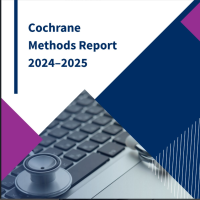
Cochrane Methods Report 2024–2025 – Summary
The 14th edition of the Cochrane Methods Report provides an overview of Cochrane’s key methodological activities in 2024–2025. The document highlights the vital role of Cochrane’s methodological community, which continuously improves the quality, relevance, and timeliness of Cochrane reviews.
1. Cochrane adapts to the community’s evolving methodological needs
The Cochrane Scientific Strategy 2025–2030 emphasizes the need to use diverse evidence synthesis methods to address key research priorities identified by the wider community.
Cochrane’s methodological guidance continues to evolve and expand, with new or updated approaches being introduced, as well as an expanding portfolio of Cochrane Handbooks to help authors apply different types of evidence synthesis methods.
2. New methods in RevMan
Cochrane has introduced new methods for random-effects analysis in RevMan, including:
- a new approach to estimating between-study variance (heterogeneity),
- calculation of confidence intervals for summary effects, and
- the addition of prediction intervals to improve interpretation of random-effects meta-analyses.
3. Responsible use of Artificial Intelligence (AI)
Cochrane, in collaboration with other organizations, leads the RAISE initiative (Responsible AI in Evidence Synthesis), focusing on responsible AI use in evidence synthesis.
In February 2025, the AI Methods Group was established — a joint initiative of Cochrane, the Campbell Collaboration, JBI, and the Collaboration for Environmental Evidence.
The group focuses on:
- improving AI literacy across organizations,
- establishing standards for AI accuracy, and
- defining transparency and disclosure frameworks for AI tool developers.
4. Updates to the Cochrane Handbook for Systematic Reviews of Interventions
Chapter 4 has been updated to reflect the latest research, tools, and best practices.
Chapter 10 includes guidance on using the random-effects model in RevMan.
Chapter 13 provides guidance for assessing risk of bias due to missing evidence (ROB-ME) in meta-analyses.
A new technical supplement to Chapter 20 provides a methodological framework for integrated systematic reviews of economic evidence.
5. New and upcoming Cochrane Handbooks
In addition to existing handbooks (Cochrane Handbook for Systematic Reviews of Interventions and Cochrane Handbook for Systematic Reviews of Diagnostic Test Accuracy), the following new publications will be available in print in 2026:
- Cochrane and Campbell Handbooks of Qualitative Evidence Synthesis
- Cochrane Handbook for Systematic Reviews of Prognosis Studies
Work has also begun on a new handbook:
- Cochrane Handbook of Rapid Reviews – details to be announced later.
6. Focus on Equity and Diversity
From 2024 onwards, all new Cochrane reviews must include sections addressing:
- equity considerations, and
- patient and public involvement.
7. Support for authors and editors (Methods Support Unit – MSU)
The MSU is a team of statisticians and methodological editors providing advice to Cochrane authors and editors. A major part of their work includes reviewing methodologically complex reviews for the Central Editorial Service.
Since its launch in 2019, the MSU has responded to over 1,750 support requests.
MSU activities include:
- webinars on methodological and statistical topics,
- Q&A sessions (e.g., on “Summary of Findings” tables), and
- a Methods and Statistics Tutorials series addressing challenging topics.
MSU also consults across the Central Executive Team and collaborates on projects such as implementing new random-effects methods in RevMan. In 2024, the unit conducted research on how Cochrane authors incorporate evidence from non-randomized studies of interventions into their reviews.
8. Other Cochrane methodological activities (2024–2025)
Cochrane continues to provide global education to reduce knowledge gaps in evidence synthesis methods. Newly developed resources include:
Online course: Foundations of Network Meta-Analysis – developed and piloted by MSU, planned for early 2026 (without formal input from the Comparing Multiple Interventions Methods Group).
Cochrane Learning Live webinar series on statistical analysis in systematic reviews, aimed at authors and trainers from low- and middle-income countries.
New webinar collections covering specialized topics such as:
- Rapid Reviews,
- qualitative evidence synthesis,
- Network Meta-Analysis,
- risk of bias assessment methods and tools, and
- AI use in evidence synthesis.
Introductory webinars were also held on methods for various review types, including:
- prognosis reviews,
- “living” systematic reviews, and
- diagnostic test network meta-analyses.
Additionally, webinars covered the Cochrane Focused Review Format template and guidance on writing clear summaries, abstracts, and protocols for Cochrane reviews.
9. Cochrane Evidence Synthesis and Methods (CESM) journal
The CESM journal offers methodological and statistical tutorials with interactive micro-learning modules that help readers—especially early-career researchers—apply methods in practice.
MSU co-edits this series and contributes many of the tutorials.
The journal currently has an open call for submissions for a special issue:
Submission deadline: 1 March 2026.
10. Newly approved methodological tools and guidance
In 2025, Cochrane approved four optional tools for qualitative evidence synthesis.
In 2024, methodological guidance was approved for including non-randomized studies of interventions as an optional evidence source for future Cochrane review authors. These guidelines will soon be published in a peer-reviewed journal.
11. Contributions of Cochrane Methods Groups
Cochrane acknowledges the expertise and contributions of the Cochrane Methods Groups.
Their achievements for 2024–2025 are showcased in a series of spotlights highlighting their work in:
- methodological research and development,
- creation of best practices and guidance, and
- implementation of methodological innovations.
Access the full Cochrane Methods Report here.
